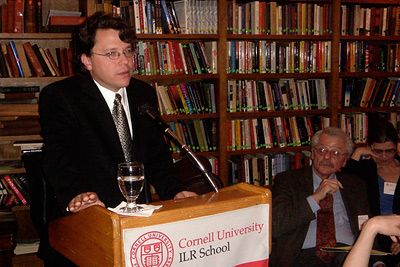CU professors: Expect no New Deal; 'Era of big government helping working people is over'
By John Mikytuck

Although some think that Barack Obama's election set the stage for a new New Deal, two Cornell professors, speaking March 18 in New York City, said that Franklin D. Roosevelt's postwar era was "a long exception," and it was unlikely we'd see such Roosevelt-style politics in the future.
While the era of big government may not be over, "the era of big government helping working people is over," said Jefferson Cowie, an associate professor of history in ILR. Cowie presented "The Constraints of History: Obama, the New Deal and American History" with Nick Salvatore, Cornell professor of ILR and American studies, at the Cornell Club as part of a Cornell Institute for Workplace Studies Colloquium Series.
Drawing references from their upcoming 2011 book, "The Long Exception: An Interpretation of the New Deal from FDR to Obama," Cowie and Salvatore discussed comparisons between Roosevelt's era and Obama's first year in office.
"The trauma of the Great Depression was the catalyst that allowed Roosevelt to act on behalf of the rights and benefits of American citizens," said Salvatore, the Maurice and Hinda Neufeld Founders Professor of Industrial and Labor Relations at Cornell. But, "the cultural landscape for President Barack Obama is distinct and separate from Roosevelt's era," said Cowie.
By 1933, nearly four years after Wall Street had crashed and President Herbert Hoover had done little to address the suffering caused by it, "the economic, political and cultural landscape was ready for reform," said Salvatore. "Roosevelt had the political wind at his back," he said, and soon offered "an enormous rush of legislation," creating the Securities and Exchange Commission, Wagner Act, Fair Labor Standards Act and Social Security Act. Roosevelt also used direct government intervention to create jobs via the Civilian Conservation Corps, Works Progress Administration and the Tennessee Valley Authority, most of which focused on job creation and the redistribution of wealth.
But Obama has a different set of circumstances, said Salvatore. For one, Obama has a tenuous relationship with labor, including an ambivalent relationship to the unions' most important legislative initiative, the Employee Free Choice Act.
"Even the rhetoric the two men employ is vastly different," said Cowie. For example, he said, while pushing for financial reform this past year, Obama tried to justify his actions, saying, "Americans don't begrudge someone's wealth." In contrast, Roosevelt attacked the "unscrupulous money changers" who stood "indicted in the court of public opinion."
"The power of the New Deal was the capacity to change people's lives," said Cowie. "No regular guy has seen his material position improve more since." Between 1949 and 1970, working-class incomes doubled, resulting in visible payoffs including home ownership, increased purchasing power, less repression and the beginnings of "working-class liberalism." Since the 1970s, however, incomes have basically stagnated, said Cowie, and "even the relative rise in working women's incomes is attributable to the decline of men's incomes."
"Today, economic inequality is the same as in the 1920s," said Salvatore, noting that it was a period when corporations first amassed a tremendous amount of power and wealth. In addition, the labor movement is now weaker than it was in 1910, when almost 10 percent of workers were unionized.
Stark patterns of economic inequality bracket both sides of the postwar era, Cowie and Salvatore argued. The New Deal, inherited by Harry Truman and then Lyndon Johnson, included the first time the government directly intervened in economic matters on behalf of the working and middle class -- not just corporations; the post-WWII era, they said, is best understood as a unique period in American history and an insufficient political analog for our own time.
John Mikytuck '90 is a freelance writer in New York City.
Media Contact
Get Cornell news delivered right to your inbox.
Subscribe